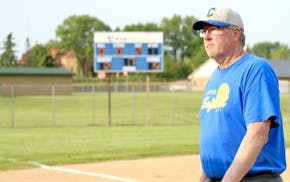BRAHAM, MINN. – A tiny high school in east central Minnesota with barely 200 students is turning out some of the world's most advanced technology.
An ethanol-fueled car that gets more than 500 miles per gallon? They've built that.
A prosthetic foot that's been used by the world's top paralympic skiers? Built that, too.
Now the tech students in this town of 1,800 some 60 miles north of the Twin Cities are working on a new project that's out of this world — literally.
They're designing a washing machine that they hope will be accepted by NASA for use on the International Space Station and, eventually, on manned missions to Mars.
"We don't build widgets here," said Luke Becker, Braham Area High's agricultural technology and physics teacher. "If it doesn't have a purpose, we don't do it."
The school's best welder is a 15-year-old girl. Another student is a finalist for the World Food Prize with a plan to help convert an impoverished nation from rice to more nutritious crops.
In international technology competitions, Braham teenagers have beaten teams from prestigious universities such as Cal Poly, Texas A&M and Louisiana Tech.
"It's a unique experience that most high school students don't get," said Ben Carlson, a senior who specializes in electrical components. "We start with bare metal and a design on a piece of paper, and it all comes together."
The students see their classroom experience as a gateway to careers in technology fields. Carlson plans to attend Minnesota State University, Mankato for automotive engineering. Bethany Helser, the ace welder, is looking at a welding career. Josh Klingensmith, the World Food Prize finalist, is headed to Brigham Young University in Provo, Utah, to study mechanical or automotive engineering.
"I like building stuff using my brains and my hands together," Klingensmith said. "All the [students'] families are really hyped about it, because it's going to get us into college."
In Becker's six years as their instructor, students have filled a trophy case with awards from technology competitions. Hanging from the walls and scattered throughout the shop are nearly a dozen tiny, aluminum-bodied cars they've built for supermileage competitions, where they've placed as high as second in the world.
The washing machine isn't the only NASA project they're working on. They're designing and building a track system to hold equipment, which NASA has already committed to put on spaceflights.
They're designing an automated feeding system for space mice. NASA regularly takes mice into space as test subjects for the effects of zero gravity and other outer-space conditions.
NASA sought proposals through its HUNCH program, short for "High schools United with NASA to Create Hardware." More than 100 schools nationwide participate, and Braham is competing on the washing machine project with about a dozen other schools.
The challenge is to come up with an effective way to wash clothes on long-term space missions, in an environment where air and water don't mix and soap can't be used. On shorter space missions, astronauts simply wear their clothes and then throw them away. For missions lasting months or even years, a different solution is needed.
The team already has built a system using a series of pumps and vacuum chambers, but NASA feared it might not be durable. Becker thinks his team has come up with a new solution that will work, but he swore observers to secrecy, not wanting to give competitors an inside look.
Braham Area High gets support from a variety of local sponsors to cover the costs of its technology programs, which can add up to $40,000 a year or more. Sponsors include the East Central Corn Growers, Haas Automation, East Central Energy, the Braham Moose Lodge and the Grandy Lions Club.
"Our community is very supportive, and we're very appreciative of that," Becker said.
Becker also is director of the annual Minnesota Supermileage competition, which pits the cars of about 50 high schools against each other at Brainerd International Raceway. It's a demanding schedule, and he admits he gets tired.
"But to get a kid that does something they never thought they could do — that's really great," he said. "There are kids who never planned to do anything [in technology] until they had these opportunities."
And there have been unexpected side benefits, he added. Becker met his wife, Roxanne, an engineer for Shell Global, at his first supermileage contest.
"To say supermileage changed my life," he said, laughing, "is an understatement."

This St. Paul native now goes by Kandi Krush, and she body-slams her opponents in the ring
Brooklyn Park City Council member censured for 2nd time
Man agrees to 6-year sentence for fatally shooting Hopkins man on edge of downtown Minneapolis

